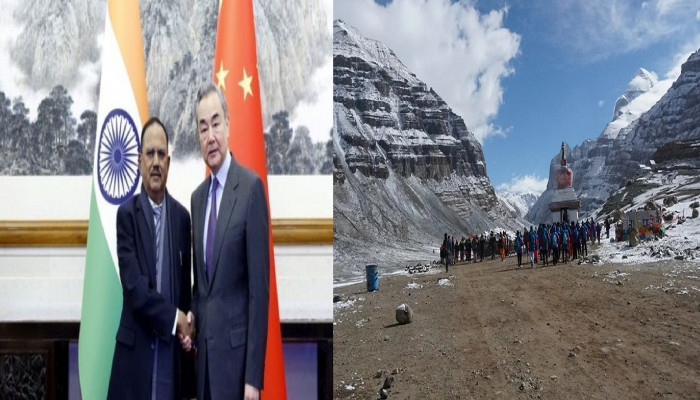India, China reach agreement to restart Mansarovar Yatra, Border trade after Beijing talks
- In Reports
- 12:52 PM, Dec 19, 2024
- Myind Staff
India and China have agreed on six key points to improve their relationship, which worsened after the 2020 military standoff along the Line of Actual Control in eastern Ladakh. These points include restarting the Kailash Mansarovar Yatra, cooperating on trans-border rivers and resuming the Nathula border trade. The agreement was made after talks between India's National Security Advisor, Ajit Doval and China's Foreign Minister, Wang Yi, who are also the Special Representatives of both countries. The talks took place in Beijing.
According to a statement from the Ministry of External Affairs, the SRs "provided positive directions for cross-border cooperation and exchanges, including resumption of the Kailash Mansarovar Yatra, data sharing on trans-border rivers, and border trade." According to the MEA, the SRs "positively affirmed the implementation of the latest disengagement agreement of October 2024, resulting in patrolling and grazing in relevant areas." This was the first time the SRs had met since tensions first appeared in the Western Sector of the India-China border areas in 2020.
“Both SRs underlined the importance of maintaining peace and tranquillity in the border areas to promote the overall development of the India-China bilateral relationship. They emphasised the need to ensure peaceful conditions on the ground so that issues on the border do not hold back the normal development of bilateral relations. Drawing on the learnings from the events of 2020, they discussed various measures to maintain peace and tranquillity on the border and advance effective border management. They decided to use, coordinate and guide the relevant diplomatic and military mechanisms towards this purpose,” the MEA said, linking the border situation to bilateral ties. In reference to the more general issue of settling the boundary dispute, it stated that the SRs reaffirmed the significance of "maintaining a political perspective of the overall bilateral relationship while seeking a fair, reasonable, and mutually acceptable framework for the settlement of the boundary question, and resolved to inject more vitality into this process."
The SRs meeting occurred less than two months after a border patrolling agreement was announced on October 21. This was followed by a meeting between Prime Minister Narendra Modi and Chinese President Xi Jinping at the BRICS Summit in Kazan, Russia on October 23. Wang Yi said the first official meeting of the SRs in five years was "hard-won and worth cherishing," according to the Chinese Foreign Ministry. Wang and Doval had "substantive discussions on the China-India border issue in a positive and constructive manner and reached six consensus," according to the Mandarin-language Beijing readout.
The first consensus, it stated, was that “both sides positively evaluated the solution reached between the two countries on border issues, reiterated that the implementation work should continue, and believed that the border issue should be properly handled from the overall situation of bilateral relations so as not to affect the development of bilateral relations. Both sides agreed to continue to take measures to maintain peace and tranquillity in the border areas and promote the healthy and stable development of bilateral relations”.
The second consensus, it stated, was that the two sides “reaffirmed their commitment to continue seeking a fair, reasonable and mutually acceptable package solution to the boundary issue in accordance with the political guidelines agreed upon by the special representatives of the two countries on resolving the boundary issue in 2005, and to take positive measures to promote this process”.
The third consensus was that the two sides “agreed to further refine the management and control rules in the border area, strengthen the building of confidence-building measures, and achieve sustainable peace and tranquillity on the border”. The fourth consensus, it said, was that the “two sides agreed to continue to strengthen cross-border exchanges and cooperation, and promote the resumption of Indian pilgrims’ pilgrimage to Tibet, China, cross-border river cooperation and Nathula border trade”.
The fifth consensus, it said, was that the “two sides agreed to further strengthen the construction of the special representatives’ meeting mechanism, enhance coordination and cooperation in diplomatic and military negotiations, and require the China-India Working Mechanism for Consultation and Coordination on Border Affairs (WMCC) to carry out follow-up implementation of this special representatives’ meeting”.
The sixth consensus was that the “two sides agreed to hold a new round of special representatives’ meetings in India next year and the specific time will be determined through diplomatic channels”. The Chinese statement remarked that the two sides also had an “extensive and in-depth exchange of views on bilateral, international and regional issues of common concern, emphasising the importance of a stable, predictable and good China-India relationship to international and regional peace and stability”.
Next year will mark the 75th anniversary of the establishment of diplomatic relations between China and India. As per Beijing’s readout, Doval stated, “Over the past five years, with the joint efforts of both sides, relevant issues in the border area have been properly resolved, which is of great significance. India is willing to maintain fruitful communication with China in a pragmatic manner and continuously accumulate conditions for the final resolution of the border issue.”
The MEA statement also said that the SRs “exchanged views on bilateral, regional and global issues of mutual interest”. It further said, “They agreed on the salience of stable, predictable and amicable India-China relations for regional and global peace and prosperity.”







Comments